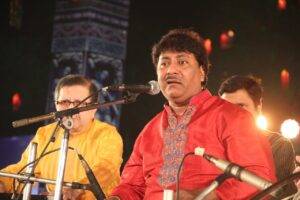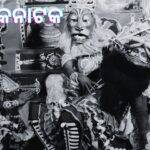This week, any conversations about Indian Classical music came to an abrupt halt as the news of the untimely demise of the legendary contemporary Indian classical singer, Ustad Rashid Khan, spread like wildfire. His passing has cast a somber shadow over the vibrant world of Indian classical music, leaving a void that seems difficult to fill. Ustad Rashid Khan was not just a maestro in the realm of classical music; he was a virtuoso whose vocal prowess and emotive renditions had the power to transport listeners to another realm. His contributions to Indian classical music extended beyond the stage. Khan’s commitment to preserving and promoting the art form was evident in his role as a dedicated teacher and mentor. He played a crucial role in nurturing the talents of aspiring musicians, ensuring the continuity of the classical music tradition for future generations. His performances were marked by an unparalleled blend of technical brilliance and profound emotional expression. His mastery over intricate ragas and soul-stirring compositions earned him accolades not only in India but also on the global stage. Khan’s ability to connect with audiences on a deeply spiritual and emotional level made him a revered figure in the world of music.
Even though Ustad Rashid Khan was renowned as a vocal musician, his influence extended far beyond the realm of vocalists, resonating profoundly with anyone in Indian classical music, be it a vocalist or instrumentalist. Particularly those devoted to mastering the intricacies of sur and saaj. As a young student immersed in the world of Indian classical music, specifically learning the sitar, I vividly recall the significant impact Ustad Rashid Khan had on our musical journey in Kolkata. From the early stages of my sitar education, hardly a concert of him was missed by us eager learners. His performances served not just as recitals to be enjoyed but as invaluable lessons and sources of inspiration. Ustad Rashid Khan’s mastery over ragas and his emotive renditions became guiding lights for those navigating the intricate pathways of classical music on instruments like the sitar. What set Ustad Rashid Khan apart was not only his vocal brilliance but also his ability to convey the essence of ragas in a manner that transcended vocal boundaries. His series of recordings emerged as a treasure trove for students like us, providing a rich repository of knowledge on the intricate nuances of raags and their melodic expressions. These recordings became our companions in the learning process, serving as both instructors and companions on the journey to understanding and mastering the intricacies of Indian classical music.

In the context of transcending the boundaries between vocal and instrumental expressions in Indian classical music, Ustad Rashid Khan showcased an exemplary collaboration through his mesmerizing jugalbandi with the renowned sitar maestro, Ustad Shahid Pervez Khan. This captivating performance, still accessible on YouTube, stands as a testament to the unparalleled greatness of both these musical luminaries. The jugalbandi, or duet, became a platform for musical alchemy, where Ustad Rashid Khan’s soulful vocals seamlessly intertwined with the intricate sitar melodies crafted by Ustad Shahid Pervez Khan. This collaborative masterpiece not only showcased the technical virtuosity of both musicians but also underscored their deep understanding of each other’s craft. In this performance, Ustad Rashid Khan’s emotive vocal expressions find resonance with the intricate and expressive sitar playing of Ustad Shahid Pervez Khan. The synergy between their respective art forms elevates the jugalbandi into a sublime experience, where the boundaries between vocal and instrumental traditions blur, giving rise to a harmonious fusion of melody and rhythm. Their jugalbandi not only echoes the greatness of these unparalleled musicians but also stands as a beacon for aspiring artists, illustrating the transformative power of music to bridge gaps and create a harmonious union between diverse musical expressions.
In addition to his masterful command over the subtle nuances of Khayal singing, Ustad Rashid Khan’s artistic versatility extended into the domain of thumri, films, and modern music, where his creations left an indelible mark. Who can forget his “Yaad Piya Ki aye”? His rendition of this timeless thumri was imbued with emotional depth, allowing listeners to experience the poignant themes of love and longing. The seamless blend of classical finesse and emotive storytelling marked his thumri performances, elevating them to the timeless musical expressions. Ustadji’s foray into films and contemporary music reflected a dynamic balance between tradition and experimentation. His contributions to the cinematic world and modern musical collaborations showcased his adaptability and openness to exploring new horizons. While rooted in the classical tradition, he embraced the evolving landscape of music, demonstrating a rare ability to bridge the gap between the classical and the contemporary.
The untimely demise of Ustad Rashid Khan is an immense loss to the world of music. His passing has left a void, and the music mourns not only the maestro himself but also the countless melodies that could have been crafted had he been with us. The abruptness of his departure robbed the world of classical music of numerous possibilities that could have enriched the musical landscape. As we grapple with the permanence of his departure, Ustad Rashid Khan’s enduring legacy remains etched in his timeless music. While he may no longer be physically present, his artistry lives on, promising to echo through the corridors of classical music for ages to come. His absence will be deeply felt, but the indelible mark he has left on the musical world ensures that he will be remembered and missed perpetually through the resonance of his timeless compositions.






